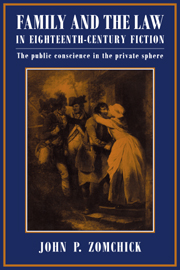Book contents
- Frontmatter
- Contents
- Preface
- Acknowledgments
- 1 Introduction
- 2 Roxana's contractual affiliations
- 3 Clarissa Harlowe: caught in the contract
- 4 Tame spirits, brave fellows, and the web of law: Robert Lovelace's legalistic conscience
- 5 Roderick Random: suited by the law
- 6 Shadows of the prison house or shade of the family tree: Amelia's public and private worlds
- 7 The embattled middle: longing for authority in The Vicar of Wakefield
- 8 Caleb Williams: negating the romance of the public conscience
- Bibliography
- Index
- Frontmatter
- Contents
- Preface
- Acknowledgments
- 1 Introduction
- 2 Roxana's contractual affiliations
- 3 Clarissa Harlowe: caught in the contract
- 4 Tame spirits, brave fellows, and the web of law: Robert Lovelace's legalistic conscience
- 5 Roderick Random: suited by the law
- 6 Shadows of the prison house or shade of the family tree: Amelia's public and private worlds
- 7 The embattled middle: longing for authority in The Vicar of Wakefield
- 8 Caleb Williams: negating the romance of the public conscience
- Bibliography
- Index
Summary
For Law, in its true Notion, is not so much the Limitation as the direction of a free and intelligent Agent to his proper Interest, and prescribes no further than is for the general Good of those under that Law.
John Locke, Two Treatises of Government, 2.57.348The novel, the law, and the juridical subject
In times of change (no matter how gradual that change may seem to our postmodern sensibility), when all that is solid melts into air as easily as Moll Flanders' husbands or Captain Booth's money, intelligent agents seeking proper interests need direction. Early modern England was such a time, experiencing a number of modest and not-so-modest “revolutions” in which law played a directive part. There was a revolution in historiography that generated new interest in describing and explaining continuity and change, custom and innovation over time. There were the political revolutions that generated new theories of power and authority. And there were the commercial revolutions that generated new forms of social life. Just as the law played a directive role in the constitution of these new forms of social life, so too it played a formal role in one of the last revolutions of the early modern period: the revolution in literature that endowed the novel with the legitimacy that would lead to its hegemony in nineteenth-century culture. In history, in politics, in economics, and above all in the sense of what it means to be human, law shaped, empowered, and authorized.
- Type
- Chapter
- Information
- Family and the Law in Eighteenth-Century FictionThe Public Conscience in the Private Sphere, pp. 1 - 31Publisher: Cambridge University PressPrint publication year: 1993

